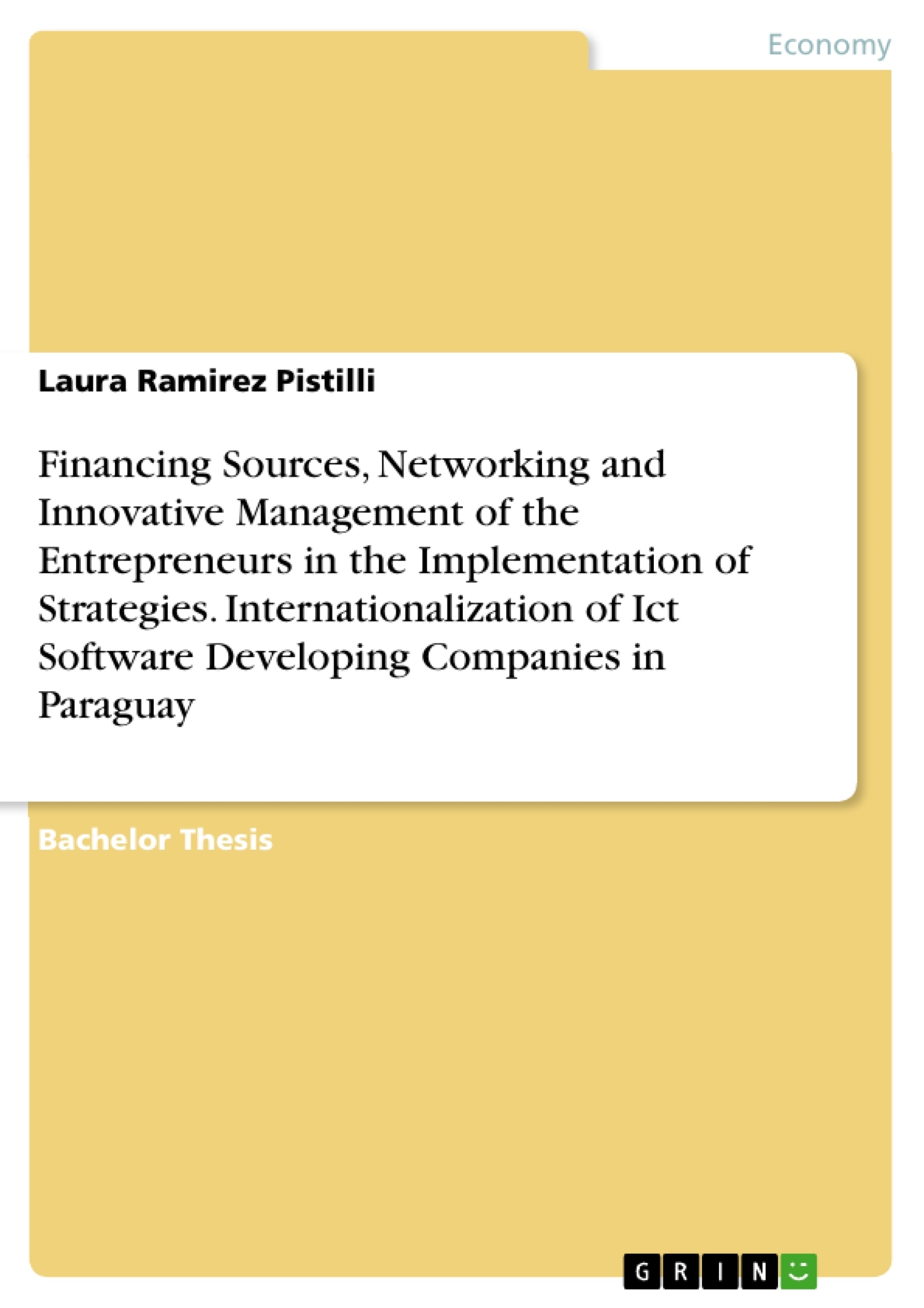The goal of this study is to analyze the innovative management of the entrepreneur, networking and sources of financing in the implementation of strategies for the internationalization of ICT companies that develop software in Paraguay.
The objectives of this work are to characterize the entrepreneur in his vision and training for innovation in the internationalization of the companies studied; know if the entrepreneur experience in business management is considered important to achieve success; identify networking as an influential factor in the internationalization mechanisms of the companies studied; evaluate the importance of funding sources in the internationalization of the companies studied.
The data was collected from interviews with the managers or entrepreneurs participating or not of the internationalization processes of each firm. The results show that although there is an early export tendency as well as a gradual internationalization, which are analyzed by the Models of Born Global Firms and Uppsala, the software development companies in Paraguay do not have an organized and pre-meditated plan or method of internationalization.
This is how it was possible to find and affirm the important role of the entrepreneur in terms of his vision and preparation as well as having a network of contacts or established partners.
Inhaltsverzeichnis (Table of Contents)
- INTRODUCTION
- Problem Statement
- Objectives
- General
- Specifics
- Justification
- Scope of the Investigation
- Structure of the Thesis
- THEORETICAL FRAMEWORK
- Concept of internationalization
- Internationalization Theories
- Innovative management of the entrepreneur
- Networking
- Financing founds
- METHODOLOGICAL FRAMEWORK
- Methodological aspects
- Universe, population, sample
- Kind of investigation
- Information sources
- Methods for obtaining and processing information
- Data collection instrument
- Theoretical Model
- RESULTS AND ANALYSIS
- Intro to the current view on internationalization
- Characterize the entrepreneur in his vision and training for innovation in the internationalization of the companies studied.
Zielsetzung und Themenschwerpunkte (Objectives and Key Themes)
This study aims to analyze the innovative management of entrepreneurs, networking, and financing sources in implementing strategies for internationalizing ICT software development companies in Paraguay.
- Characterize the entrepreneur's vision and training for innovation in internationalization.
- Assess the importance of the entrepreneur's business management experience for achieving success.
- Identify networking as a key factor in the internationalization mechanisms of the companies studied.
- Evaluate the importance of funding sources in the internationalization process.
- Analyze the internationalization strategies used by software development companies in Paraguay.
Zusammenfassung der Kapitel (Chapter Summaries)
The introduction defines the problem statement, objectives, justification, scope, and structure of the thesis. The theoretical framework delves into the concept of internationalization, exploring various theories and discussing innovative management practices, networking, and financing sources. The methodological framework outlines the research methodology, including the sample selection, data collection methods, and theoretical model. The results and analysis section provides insights into the current view on internationalization and examines the characteristics of entrepreneurs in relation to their vision and training for innovation in the internationalization of the companies studied.
Schlüsselwörter (Keywords)
The study focuses on key concepts such as ICT, internationalization, entrepreneurship, networking, Born Global Firms, Uppsala Model, and innovative management. The research explores the role of these elements in the context of internationalizing software development companies in Paraguay.
Frequently Asked Questions
What is the main goal of this study on Paraguayan ICT companies?
The study analyzes how innovative management, networking, and financing sources influence the internationalization strategies of software development companies in Paraguay.
How do Paraguayan software companies typically internationalize?
They often follow the Born Global or Uppsala models, showing early export tendencies. However, the study found they usually lack an organized, pre-meditated plan for international expansion.
What role does the entrepreneur play in this process?
The entrepreneur's vision, training for innovation, and management experience are considered crucial factors for the successful internationalization of these firms.
How important is networking for international success?
Networking is identified as a key influential factor. Having established partners and a strong network of contacts significantly aids the internationalization mechanisms of Paraguayan ICT firms.
What were the findings regarding financing sources?
The research evaluates the importance of various funding sources and how their availability impacts the ability of small software companies to enter international markets.
- Quote paper
- Laura Ramirez Pistilli (Author), 2017, Financing Sources, Networking and Innovative Management of the Entrepreneurs in the Implementation of Strategies. Internationalization of Ict Software Developing Companies in Paraguay, Munich, GRIN Verlag, https://www.grin.com/document/387408



